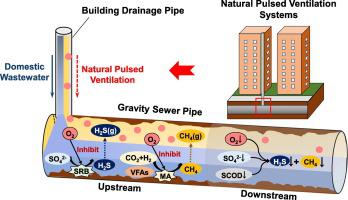Science of the Total Environment ( IF 9.8 ) Pub Date : 2020-06-29 , DOI: 10.1016/j.scitotenv.2020.140579 Ruyue Gao 1 , Zhiqiang Zhang 1 , Tingwei Zhang 1 , Junzhuo Liu 1 , Jinsuo Lu 2

|
Production of sulfide and methane due to anaerobic biological transformations in sewer pipes causes serious problems to sewer maintenance. For gravity sewers, enhancing ventilation is a practical method that reduces the production of both sulfide and methane. This study aimed to determine the effectiveness of a new method, Upstream Natural Pulsed Ventilation (UNPV), to control sulfide and methane production in gravity sewers. Two lab-scale reactors simulating the gravity sewer pipe with and without ventilation were set up to assess the effectiveness. The results show that compared with the gravity sewer pipe without ventilation, under the UNPV condition, the total sulfide concentration reduced by 39.08% and 58.74%, and the methane concentration reduced by 42.29% and 35.70% in the upstream and downstream sewer pipe, respectively. High-throughput sequencing analysis showed that the UNPV method could inhibit the proliferation of sulfate-reducing bacteria and stimulate the proliferation of sulfur-oxidizing bacteria within the whole sewer pipe. The composition of methanogenic archaea that are responsible for methane production was changed by ventilation. The increased oxidation-reduction potential and organic carbon transportation in wastewater under ventilation may be responsible for the microbial community changes. The findings of this study may provide new insight to reduce sulfide and methane production in gravity sewers.
中文翻译:

上游自然脉冲通风:一种控制重力下水道中硫化物和甲烷产生的简单措施。
由于下水道中厌氧性生物转化而产生的硫化物和甲烷给下水道的维护带来了严重的问题。对于重力下水道,增强通风是减少硫化物和甲烷产生的实用方法。这项研究旨在确定一种新方法的有效性,即上游自然脉冲通风(UNPV),用于控制重力下水道中的硫化物和甲烷生成。建立了两个实验室规模的反应器,模拟了有无通风的重力下水道,以评估其有效性。结果表明,与无通风的重力下水道相比,在UNPV条件下,上,下水道的总硫化物浓度分别降低了39.08%和58.74%,甲烷浓度分别降低了42.29%和35.70%。 。高通量测序分析表明,UNPV方法可以抑制还原硫酸盐的细菌的增殖,并刺激整个下水道中的硫氧化细菌的增殖。通过通风改变了负责甲烷生产的产甲烷古菌的成分。通风条件下废水中氧化还原电位的增加和有机碳的运输可能是微生物群落变化的原因。这项研究的结果可能为减少重力下水道中硫化物和甲烷的产生提供新的见解。通过通风改变了负责甲烷生产的产甲烷古细菌的组成。通风条件下废水中氧化还原电位的增加和有机碳的运输可能是微生物群落变化的原因。这项研究的结果可能为减少重力下水道中硫化物和甲烷的产生提供新的见解。通过通风改变了负责甲烷生产的产甲烷古菌的成分。通风条件下废水中氧化还原电位的增加和有机碳的运输可能是微生物群落变化的原因。这项研究的结果可能为减少重力下水道中硫化物和甲烷的产生提供新的见解。


























 京公网安备 11010802027423号
京公网安备 11010802027423号